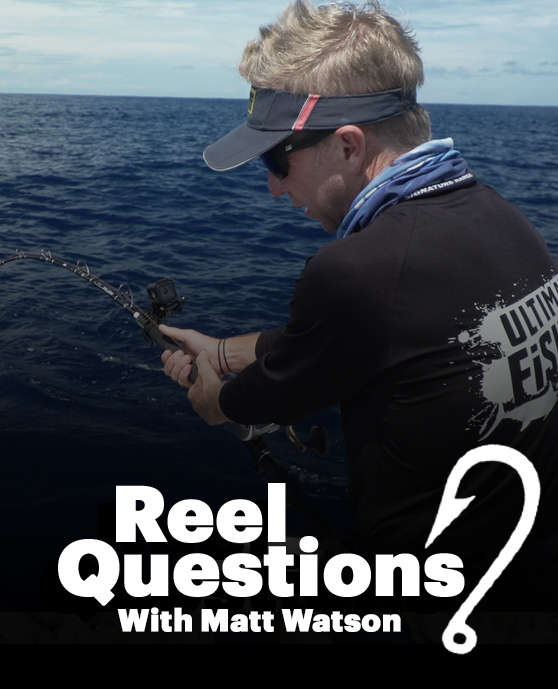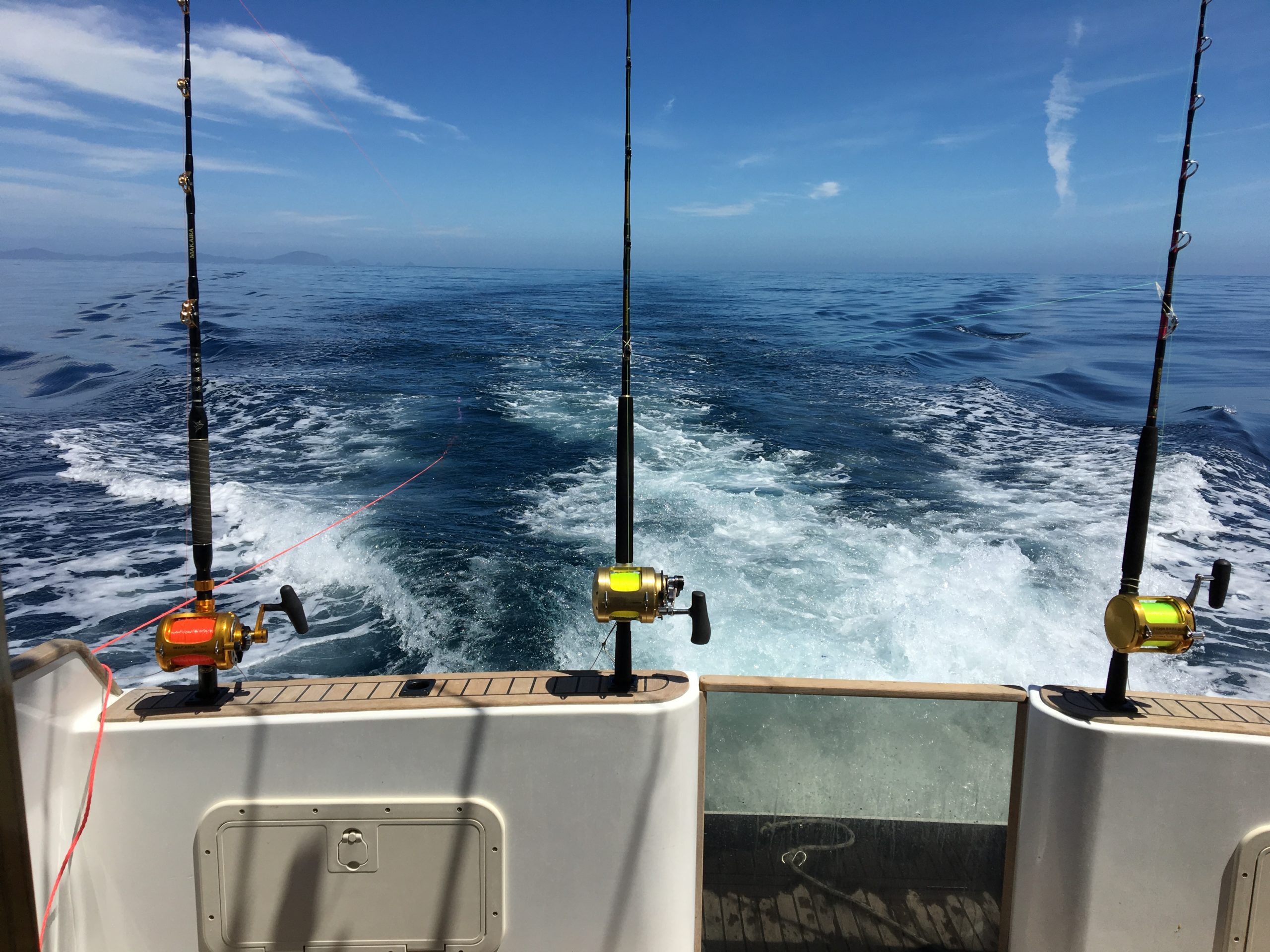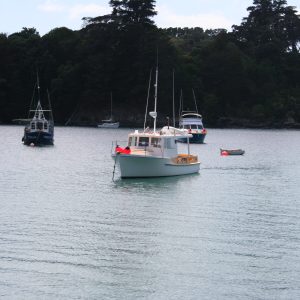Reel Questions is a commentary series providing an insight to the opinions and experiences of individuals who have ties with our fish life and marine environment whether it be their livelihood, playground, creative influence, culture or simply a part of their lives. They all have a varied relationship with our coast and fish.
Matt Watson needs no introduction. He is one of New Zealand’s best known and well respected fishers and his shows on TV and around the internet are educational as well being extremely entertaining. Matt also has deep empathy and understanding of the marine environment in which he spends a lot of his time
You can watch all his shows on UltimateFishing.tv or watch the latest ITM Fishing on TV Three, Sunday at 5.00pm.
1. Do you recall the first time you ever went fishing? When was it, who with and what did it feel like?
I can remember it like it was yesterday. I was nearly 4 and had got my first fishing rod for Christmas. It was my most prized possession – I slept with it in my bed every night – and had taken it out on the dingy with Mum and Dad in the Manukau Harbour. When I felt that first almighty tug on my line, my initial response was dread. I turned to my parents for help and they were both pissing themselves laughing. I felt like I was going to cry. I tried three or four times to give Dad the rod, but he wouldn’t take it. It was a huge rush of relief to get it on board. I remember having it for dinner that night; Dad saying, “This is the fish that you caught boy,” and feeling so proud.
2. If you think back to then and did it for the first time again today would it be any different? What has changed since if anything?
That was in the main channel, straight out the end of Weymouth Rd where we lived. Mum’s parents had started a commercial fishing business gill netting for flounder and mullet back when there were only four houses in Weymouth. Mum said in her day, at low tide they could drive their trucks across the sand to the channel. The men would gut the flounder and throw it on the sandbank where snapper would come in on the incoming tide to feed. Mum and her sister would buy a fishhook from the dairy and tie it to a stick with baling twine. They could grab a fistful of guts, wrap it around the hook and lob it in front of the biggest snapper there, and then drag it up the bank and beach it. They caught snapper up to 30 pounds doing that. When I was a kid, if you caught one snapper, you’d cracked it for the day.
3. When did you decide that a career in fishing was for you and how did that evolve to what it is today?
I started working in commercial fishing for my uncles when I was 12 and got put on a share of the catch from 14. I’d work every weekend and holidays. If I didn’t sleep much, I could make more in a weekend than my parents did in a week. By the time I finished school, I’d logged 3,500 commercial fishing sea hours and could go for my skipper’s certificate.
The first time I questioned commercial fishing practices was one night when I found a live snapper in the net. It was legal but nothing special, so I threw it back in. I got a clip around the ear from my uncle who said, “Boy, if it weighs, it pays”. My father’s family were recreational fishers so that side of me was thinking, “That fish will be a lot more valuable caught on a long line.” I believe most commercial fishers care about the ocean. They love fishing, that’s why they do it, but money can corrupt. I’d estimate the proportion of rotten commercial and recreational fishers is about the same.
4. What’s your biggest concern right now about the state of New Zealand’s wild fish resources?
Bottom trawling is the biggest single issue right now. It’s not selective, so what gets taken is uncontrolled and it’s damaging the habitat. I’ve seen fish getting dumped overboard – we got footage of the fish floating in the water and a trawler in the area, but apparently that wasn’t enough evidence for Fisheries to do anything about it.
5. If you were the Minister of Oceans and Fisheries today what would be the first thing you would do to address the future health of our marine environment?
Ban bottom trawling. Obviously, there’d need to be some phase-out period to give them some time to adjust but after that, no contact with the sea floor for trawlers – simple as that. It could be policed by cameras on boats. They’re coming, aren’t they?
6. Have you ever thought of entering the political arena to represent the people on issues you feel are important?
If that was the only way to make serious change, I’d consider sacrificing a few years of my life but I’d much rather advocate and encourage from the outside. Education has made a difference. When I first popped up on TV 17 years ago and suggested people release the bigger breeding fish, I got called a hippie and a greenie. Now it’s cool. Education takes time. People see fishing as an escape from their busy lives. It’s freedom – no boss telling them what to do. If I rocked up and told them they were bad people they’d just say, “F*$k you, we’ll do whatever we want, it’s our time,” and have another beer. I try to set an example and persuade people that if we want our kids to love fishing as much as we do, we need to take care of the fishery. Having kids does change your outlook; you become less selfish.
7. What is your greatest achievement as an influencer bringing fishing to the masses?
What makes me feel most proud is when I have red blooded Kiwi blokes come up to me and say, “I had to let my biggest-ever snapper go today because my kids made me. You got into their heads and told them those breeding stock are for future generations.” I’ll ask them how they felt about it, and they’ll say, “Well actually, it felt so good, mate. I’ll never keep a big one again.” To be able to turn people’s thinking around is very satisfying. The Kiwi male is the hardest creature to educate in the world – just ask my wife. It’s being positive and giving people a reason to shift the mindset.
8. COVID 19 has impacted many things. What impact if anything do you think it has had on fish and fishing both commercially and recreationally?
None. Commercial fishing carried on in earnest. I’ve got a commercial fishing friend up here who says they had a great time fishing all the recreational fishing areas with no rec boaties to get the way or tell on them if they got too close to the shore. All the fish was exported – it wasn’t to feed NZers. They were considered a primary industry like farmers. So basically they were allowed to line their own pockets. It just goes to how much power and influence the commercial fishing lobby has. We allowed the fishing industry to bring Russian and Ukrainian sailors with Covid-19 into our ports so they could catch hundreds of tonnes of hoki which are overfished. Meanwhile orchardists are going out of business while their fruit rots on the ground because they can’t bring in pickers from Covid-free Pacific Islands. It just boggles the mind.
9. There have been a lot of changes and developments in New Zealand fishing in the last 100 years. What will fishing in New Zealand look like 100 years from now?
The optimist in me would like to say that some of the things my mum and dad’s generation got to see and experience would be around but it’s linked to so many factors; land run-off, climate change. There’s so much in balance. In a hundred years we could be catching sail fish and having coral reefs growing here – who knows?
10. Your ability to target and catch most species of seafood is legendary but what’s your favourite seafood to eat and how do you prepare that for the table?
Raw tuna – just get a loin, slice it up and eat it. Occasionally it’ll see some soy sauce, but that’s about it. If I’m doing it for guests to look fancy on a sashimi board, I’ll get out my razor sharp Japanese knives. If it’s me on the boat, I will literally cut off a steak-sized chunk and just eat it – pretty much like a grizzly bear – but I was raised pretty hoary.





